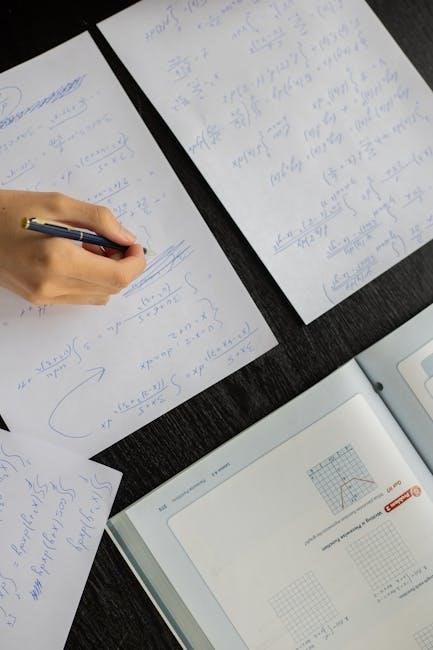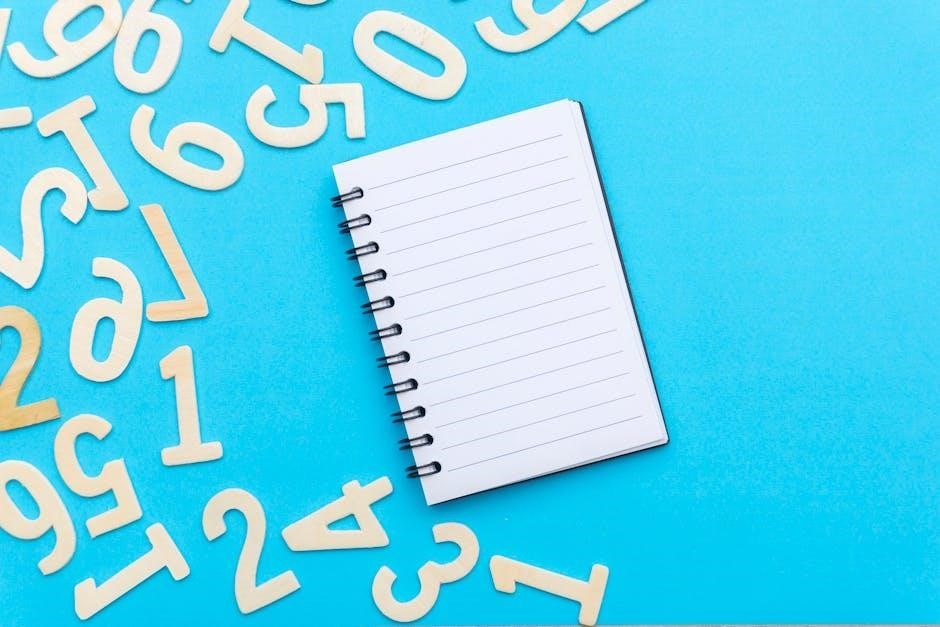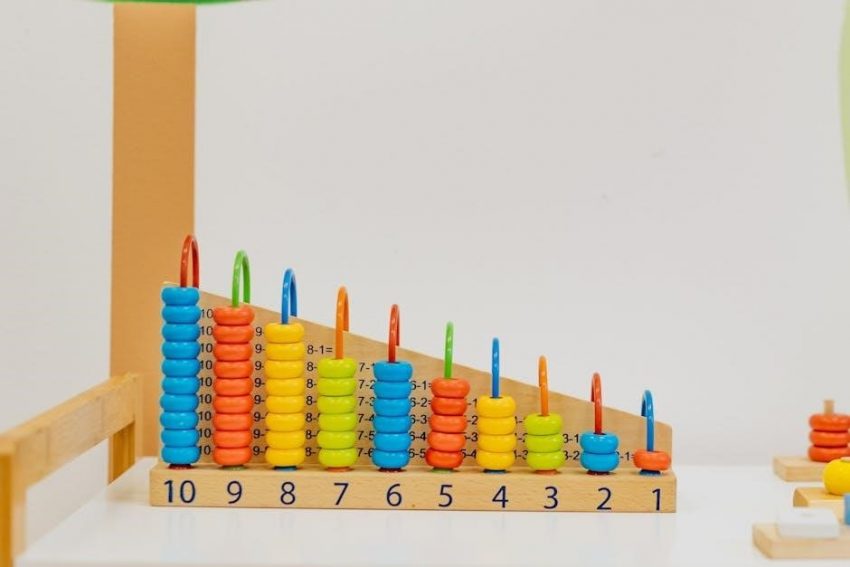Arithmetic puzzles are engaging brain teasers that enhance math skills through fun challenges, offering PDF resources for all ages to boost logical thinking and problem-solving abilities.
What Are Arithmetic Puzzles?
Arithmetic puzzles are engaging mathematical challenges that involve numbers and basic operations like addition, subtraction, multiplication, and division. Designed to test problem-solving skills, they often present scenarios requiring logical thinking and step-by-step analysis. These puzzles can range from simple calculations to complex sequences, making them suitable for various age groups. Available in formats like PDF books, they provide a fun and interactive way to practice math, enhancing fluency and critical thinking. By solving these puzzles, individuals develop a deeper understanding of arithmetic concepts while improving their mental agility and accuracy.
Importance of Arithmetic Puzzles in Learning
Arithmetic puzzles play a vital role in enhancing cognitive skills and fostering a strong foundation in mathematics. They improve critical thinking, problem-solving abilities, and logical reasoning. By engaging with these puzzles, learners develop mental agility and accuracy in calculations. Additionally, they make math enjoyable and accessible, reducing anxiety often associated with numerical problems. Regular practice through PDF resources builds confidence and fluency, preparing individuals for academic and real-world challenges. These puzzles also encourage creativity and persistence, making them a valuable tool for learners of all ages to excel in mathematics and beyond.

Types of Arithmetic Puzzles
Arithmetic puzzles include basic operations, logic-based problems, word problems, and number sequences, each enhancing math fluency, critical thinking, and problem-solving skills in engaging ways.
Basic Arithmetic Operations Puzzles
Basic arithmetic operations puzzles focus on fundamental math skills like addition, subtraction, multiplication, and division. These puzzles, often found in PDF resources, present simple yet engaging challenges that reinforce core mathematical concepts. They are ideal for learners of all ages, helping to build fluency and confidence in performing calculations. By solving these puzzles, individuals can strengthen their foundation in arithmetic, making them a valuable tool for both education and entertainment. These puzzles are widely available in PDF formats, offering a convenient way to practice essential math skills in a fun and interactive manner.
Logic-Based Arithmetic Puzzles
Logic-based arithmetic puzzles combine mathematical operations with reasoning and critical thinking. These puzzles often require solving equations, identifying patterns, or applying algebraic principles. They challenge individuals to think creatively and systematically, enhancing problem-solving skills. Available in various PDF resources, these puzzles are designed to stimulate mental agility and sharpness. By integrating arithmetic with logical reasoning, they provide a comprehensive cognitive workout, making them ideal for learners seeking to improve both math fluency and analytical abilities. These puzzles are popular in educational materials and recreational math books, offering a fun and intellectually stimulating experience.
Word Problem Puzzles
Word problem puzzles are arithmetic challenges presented in narrative form, requiring both math skills and reading comprehension. These puzzles often involve real-life scenarios, such as shopping, time calculations, or distributing items, making them relatable and engaging. Common examples include determining total costs, calculating distances, or finding unknown quantities. Available in various PDF resources, these puzzles help learners practice translating words into mathematical expressions. They are widely used in educational materials to enhance problem-solving abilities and critical thinking. Solving word problems fosters a deeper understanding of arithmetic in practical contexts, making them a valuable learning tool for all skill levels.
Number Sequence Puzzles
Number sequence puzzles involve identifying patterns in a series of numbers to determine the next or missing value. These puzzles often require recognizing arithmetic or geometric progressions, such as increasing by a constant difference or multiplying by a ratio. Examples include sequences like 2, 4, 8, 16, where the pattern is doubling. Available in various PDF resources, these puzzles enhance logical reasoning and mathematical intuition. They are particularly effective for developing problem-solving skills and are suitable for learners of all ages, offering a fun and challenging way to practice number sense and analytical thinking.

Benefits of Solving Arithmetic Puzzles
Solving arithmetic puzzles enhances logical thinking, improves math fluency, and boosts problem-solving abilities, sharpening cognitive skills while supporting academic and professional growth through engaging challenges.
Cognitive Development and Sharpness
Solving arithmetic puzzles significantly enhances cognitive development by improving memory, concentration, and mental agility. Regular practice sharpens problem-solving skills, boosting logical reasoning and numerical comprehension. These exercises strengthen the brain’s ability to process information efficiently, fostering mental clarity and focus. For both children and adults, engaging with arithmetic puzzles stimulates neural activity, keeping the mind active and sharp. Over time, this leads to improved academic and professional performance, as well as a stronger foundation in mathematical thinking. The brain’s adaptability and responsiveness are notably enhanced through consistent puzzle-solving activities.
Stress Relief and Fun Learning
Arithmetic puzzles offer a unique combination of stress relief and enjoyable learning. Engaging with these puzzles provides a calming, focused activity that distracts from daily worries. The sense of accomplishment upon solving a puzzle boosts confidence and mood. Additionally, these puzzles present math in a fun, non-intimidating way, making learning interactive and accessible. PDF resources often include themed puzzles, turning math practice into a game-like experience. This blend of entertainment and mental exercise makes arithmetic puzzles a delightful way to unwind while sharpening skills, appealing to both children and adults seeking a relaxed learning environment.
Improved Academic Performance
Engaging with arithmetic puzzles significantly enhances academic performance by strengthening math skills and problem-solving abilities. Regular practice through PDF resources builds fluency in basic operations and logical reasoning. These puzzles help students grasp complex concepts in a structured yet engaging manner, leading to improved grades. By fostering a deeper understanding of numbers and sequences, arithmetic puzzles prepare learners for advanced math challenges. Consistent use of these resources cultivates confidence and proficiency, ultimately driving better academic outcomes and a stronger foundation for future math-related tasks.
How to Solve Arithmetic Puzzles
Mastering arithmetic puzzles requires careful reading, breaking down problems into steps, and applying logical reasoning. Practice regularly to sharpen skills and solve challenges efficiently.
Understanding the Problem Statement
Understanding the problem statement is the first step in solving arithmetic puzzles. Carefully read the problem to identify key numbers, operations, and any hidden clues. Pay attention to details like sequences, patterns, or relationships between numbers. Misinterpreting the problem can lead to incorrect solutions. Use PDF resources to practice decoding problem statements, as they often include examples and explanations. Breaking down complex problems into simpler parts helps clarify the approach. Always verify the question’s requirements to ensure your solution aligns with what is being asked. Clear understanding sets the foundation for accurate and efficient problem-solving.
Breaking Down Complex Problems
Breaking down complex arithmetic puzzles into smaller, manageable parts simplifies the solving process. Identify key numbers, operations, and relationships within the problem. Look for patterns or sequences that can be isolated and solved individually. Use visual aids or notes to organize information effectively. Many PDF resources provide step-by-step examples that demonstrate how to deconstruct intricate puzzles. By focusing on one element at a time, you can tackle even the most challenging problems methodically. This approach enhances clarity and reduces errors, making complex puzzles more accessible and enjoyable to solve.
Using Patterns and Logic
Arithmetic puzzles often rely on identifying patterns and applying logical reasoning. Recognizing sequences, relationships between numbers, and underlying mathematical principles is key to solving them. Many puzzles involve repetition, symmetry, or progression, which can be decoded through systematic analysis. Techniques like algebra, number theory, and mental math strategies are frequently used to unravel complex problems. By studying patterns and applying logical steps, solvers can uncover hidden solutions. PDF resources often include examples that highlight these methods, making it easier to master the art of logical problem-solving and enhance critical thinking abilities.
Practicing Regularly for Mastery
Consistent practice is essential for mastering arithmetic puzzles. Regular engagement with puzzle-solving enhances problem-solving skills, mental math abilities, and logical thinking. PDF resources provide a wealth of exercises tailored to different skill levels, allowing learners to gradually improve. Setting aside time daily to solve puzzles fosters familiarity with various problem types and builds confidence. Tracking progress and celebrating improvements keeps motivation high. Over time, regular practice transforms challenging problems into manageable tasks, ensuring long-term mastery and a deeper understanding of arithmetic concepts.

Educational Value of Arithmetic Puzzles
Arithmetic puzzles promote critical thinking, problem-solving, and math fluency, making learning interactive and effective. They enhance logical reasoning and mental agility, supporting academic growth and real-world applications.
Enhancing Critical Thinking Skills
Arithmetic puzzles are powerful tools for sharpening critical thinking skills, as they require logical reasoning and analytical problem-solving. By engaging with these challenges, individuals develop the ability to break down complex problems into manageable steps. Such puzzles foster a deeper understanding of mathematical concepts and improve cognitive flexibility. They encourage creative thinking and the exploration of multiple solutions, enhancing mental agility. Regular practice with arithmetic puzzles also builds confidence in tackling real-world mathematical scenarios, making them invaluable for both academic and everyday applications.
Developing Problem-Solving Abilities
Arithmetic puzzles play a significant role in developing problem-solving abilities by encouraging systematic thinking and adaptability. These puzzles often present unique challenges that require applying mathematical concepts to real-world scenarios. By tackling various types of arithmetic puzzles, individuals learn to approach problems from different angles, fostering creativity and resilience. Regular engagement with these puzzles enhances the ability to analyze situations, identify patterns, and implement effective solutions. This skill development is particularly beneficial for academic success and everyday problem-solving, making arithmetic puzzles a valuable educational tool.
Building Math Fluency
Arithmetic puzzles are an effective way to build math fluency, enabling individuals to perform calculations with speed and accuracy. These puzzles, often available in PDF formats, provide structured exercises that reinforce fundamental arithmetic operations. By consistently solving puzzles, learners develop a stronger grasp of number relationships and mental math strategies. Such activities not only enhance computational skills but also foster confidence in tackling mathematical challenges. Regular practice through arithmetic puzzles helps individuals achieve fluency, making math more accessible and enjoyable for daily applications and academic pursuits;
Arithmetic Puzzles in PDF Format
Arithmetic puzzles in PDF format are widely available, offering convenient access to a variety of math challenges. These resources include logic-based problems, number sequences, and word puzzles.
Availability of Free Resources
Free arithmetic puzzle resources in PDF format are abundant online, offering a wide range of challenges for learners of all skill levels. Popular options like Math Puzzlers and Mathematical Puzzles for Grade 6 provide engaging activities. These PDFs often include logic-based problems, number sequences, and word puzzles, making math learning fun and accessible. Many websites offer downloadable puzzle books designed for students, teachers, and enthusiasts. These resources cater to various age groups, ensuring everyone can benefit from interactive math exercises. Printing these PDFs allows for offline practice, making them a convenient tool for improving math fluency and problem-solving skills.
Popular PDF Books on Arithmetic Puzzles
Several popular PDF books offer a variety of arithmetic puzzles, catering to diverse skill levels and age groups. Titles like Math Puzzlers and Mathematical Puzzles for Grade 6 are widely recognized for their engaging content. These books feature logic-based problems, number sequences, and word puzzles, blending fun with learning. Organized by skill areas such as addition, subtraction, and multiplication, they provide structured challenges. Many of these PDFs are designed for students, teachers, and math enthusiasts alike, making them excellent resources for improving math fluency and problem-solving abilities through interactive exercises.
How to Create Your Own PDF Puzzles
Creating your own PDF arithmetic puzzles is straightforward with the right tools. Start by designing puzzles using software like Canva or Microsoft Word, ensuring clarity and visual appeal. Organize puzzles by difficulty or topic, and include solutions for reference. Use free online converters to transform your document into a PDF format. Customize the layout with grids, symbols, or images to enhance engagement. Finally, share or print your PDF puzzles for personal use, classrooms, or online platforms. This approach allows you to tailor puzzles to specific skill levels, making them both educational and enjoyable.
Advanced Arithmetic Puzzle Techniques
Advanced techniques involve using algebra, number theory, and mental math strategies to solve complex puzzles efficiently, ensuring precision and speed in problem-solving.
Using Algebra in Puzzle Solving
Algebraic methods are powerful tools for solving arithmetic puzzles, enabling the creation of equations from problem statements. By identifying variables and solving step-by-step, complex puzzles become manageable. This approach ensures accuracy and efficiency, making algebra indispensable for advanced puzzle solvers. Many PDF resources provide algebra-based puzzles, allowing learners to practice and master these techniques. Regular practice enhances problem-solving skills and prepares individuals for competitive exams. Algebraic strategies not only simplify puzzles but also deepen mathematical understanding, making them a cornerstone of advanced arithmetic puzzle solving.
Applying Number Theory Concepts
Number theory concepts, such as square-free numbers and factor analysis, are essential for solving advanced arithmetic puzzles. These principles help identify patterns, simplify calculations, and break down complex problems into manageable parts. For instance, understanding divisibility rules and prime factorization can unlock solutions to sequence and logic-based puzzles. Many PDF resources incorporate number theory techniques, offering exercises to refine these skills. Regular practice enhances fluency in applying these concepts, making them invaluable for tackling challenging arithmetic puzzles and improving overall problem-solving efficiency. This approach bridges theory with practical application, enriching the puzzle-solving experience.
Utilizing Mental Math Strategies
Mental math strategies are invaluable for solving arithmetic puzzles efficiently. Techniques like estimation, rounding, and breaking down complex calculations enable quick problem-solving. These methods enhance speed and accuracy, reducing reliance on written computations. PDF resources often include exercises that promote mental math proficiency, such as rapid arithmetic drills and logic-based puzzles. By mastering these strategies, puzzlers can tackle challenges with greater confidence and precision, improving overall performance. Mental math not only sharpens cognitive abilities but also fosters a deeper understanding of numerical relationships, making it a cornerstone of arithmetic puzzle mastery.

Real-World Applications of Arithmetic Puzzles
Arithmetic puzzles enhance daily math skills, improve problem-solving in careers, and boost competitive exam preparation by sharpening numerical accuracy and time management abilities through engaging challenges.
Improving Daily Math Skills
Arithmetic puzzles enhance daily math skills by encouraging the application of numerical concepts to real-life scenarios. They improve mental math abilities and foster strategic thinking, essential for tasks like budgeting, measuring, and time management. By solving puzzles, individuals develop practical math proficiency, making everyday calculations more efficient. These exercises, often available in PDF formats, cater to various skill levels and age groups, ensuring accessibility for all. Regular engagement with arithmetic puzzles builds confidence and speed in numerical problem-solving, ultimately enriching one’s ability to handle mathematical challenges in routine life. They serve as both educational and entertaining tools for sharpening math skills.
Enhancing Career Opportunities
Arithmetic puzzles play a significant role in enhancing career opportunities by improving problem-solving and logical thinking skills. These abilities are highly valued in professions like finance, engineering, and data analysis. Regular practice with arithmetic puzzles, especially through PDF resources, sharpens mental math and strategic planning. Employers often seek candidates with strong analytical skills, which these puzzles help develop. By mastering arithmetic puzzles, individuals gain a competitive edge in job markets that prioritize mathematical proficiency and quick decision-making. This makes arithmetic puzzles a valuable tool for career advancement and professional growth in math-intensive fields.
Boosting Competitive Exam Preparation
Arithmetic puzzles are invaluable for competitive exam preparation, enhancing speed, accuracy, and time management. They improve problem-solving strategies and mental math, crucial for exams like entrance tests. Regular practice with arithmetic puzzles sharpens logical thinking and quick decision-making, reducing exam stress. PDF resources offer convenient access to varied puzzles, covering arithmetic operations, sequences, and word problems. These tools help candidates master techniques, ensuring they tackle challenging questions with confidence. By incorporating arithmetic puzzles into study routines, aspirants can significantly improve their performance and achieve better results in competitive examinations.
Arithmetic Puzzles for Different Age Groups
Arithmetic puzzles are available for all age groups, catering to children, teenagers, and adults. They adapt to skill levels, providing fun and educational challenges for everyone.
Puzzles for Children
Arithmetic puzzles for children are designed to make learning math fun and engaging. These puzzles are tailored to young learners, helping them develop problem-solving skills and critical thinking. They often include simple arithmetic operations, number sequences, and word problems that align with their curriculum. PDF resources offer colorful, interactive designs to capture their interest. These puzzles cater to different age groups within childhood, ensuring appropriate difficulty levels. By solving these, kids build a strong foundation in math while fostering a love for numbers and logical reasoning. Regular practice enhances their math fluency and confidence.
Puzzles for Teenagers
Arithmetic puzzles for teenagers offer challenging brain teasers that align with their school math curriculum. Designed to enhance problem-solving skills, these puzzles integrate algebra, logic, and number theory. They help teens prepare for competitive exams by improving time management and mental math abilities. Many PDF resources provide graded difficulty, ensuring a smooth progression from basic to advanced levels. These puzzles not only sharpen analytical thinking but also make learning math enjoyable and engaging. Regular practice boosts their confidence and performance in both academics and competitive examinations, fostering a deeper understanding of mathematical concepts.
Puzzles for Adults
Arithmetic puzzles for adults provide mental stimulation and stress relief through engaging challenges. These puzzles enhance cognitive sharpness, improve focus, and foster logical reasoning. Available in various PDF formats, they cater to diverse skill levels, offering complex problems that sharpen problem-solving abilities. Adults can enjoy these puzzles as a fun way to keep their minds active, whether for relaxation or competitive preparation. They are versatile, suitable for both casual entertainment and professional development, making arithmetic puzzles a valuable tool for lifelong learning and mental agility.
Common Mistakes in Solving Arithmetic Puzzles
Common errors include carelessness in calculations, misinterpreting problem statements, and overcomplicating simple problems. Practicing regularly and double-checking work can help minimize these mistakes effectively.
Carelessness in Calculations
Carelessness in calculations is a frequent pitfall when solving arithmetic puzzles. Rushing through problems or neglecting to double-check work often leads to avoidable errors. This oversight can stem from overconfidence or lack of attention to detail. Simple mistakes, such as misreading numbers or misapplying operations, can result in incorrect answers. To combat this, it’s essential to approach each problem methodically, ensuring each step is accurate. Practicing with exercises from PDF resources can also help build precision and reduce careless errors. Developing a habit of reviewing work before finalizing answers is crucial for improving accuracy and confidence in problem-solving skills.
Misinterpreting the Problem
Misinterpreting the problem is a common mistake when tackling arithmetic puzzles. Often, solvers overlook key details or misunderstand the question’s requirements, leading to incorrect solutions. This error can stem from rushing through the problem statement or failing to identify critical conditions. To avoid this, it’s essential to read the problem carefully, underline important terms, and ensure a clear understanding before attempting to solve it. Breaking down complex problems into simpler parts can also help prevent misinterpretation. Regular practice with PDF resources can improve comprehension and reduce errors, fostering better problem-solving skills over time.
Overcomplicating Simple Problems
Overcomplicating simple problems is a frequent pitfall in solving arithmetic puzzles. Many solvers mistakenly apply advanced techniques to straightforward questions, leading to unnecessary confusion and errors. This often happens when individuals overthink the problem or attempt to find hidden complexities that don’t exist. Simplifying the approach and focusing on basic arithmetic operations can prevent this. Practicing with PDF resources that emphasize clear, step-by-step solutions helps build confidence and reduces the tendency to overcomplicate. By mastering fundamental concepts, solvers can tackle problems more efficiently and avoid unnecessary mental strain.
Arithmetic Puzzles in Competitive Exams
Arithmetic puzzles are crucial in competitive exams, often appearing as 5-7 questions; They test logical thinking and math skills, with PDF resources offering ample practice opportunities.
Role in Entrance Examinations
Arithmetic puzzles play a significant role in entrance examinations, with 5-7 questions often appearing in competitive tests. These puzzles assess logical thinking, math skills, and problem-solving abilities under time pressure. PDF resources provide ample practice material, helping candidates master arithmetic concepts and strategies. They are designed to challenge candidates’ analytical minds and prepare them for complex problem-solving scenarios. Regular practice with these puzzles enhances speed, accuracy, and confidence, making them indispensable for exam preparation. They are a key tool for aspiring students aiming to excel in competitive entrance exams.
Time Management Strategies
Mastering time management is crucial for solving arithmetic puzzles efficiently, especially in competitive exams. Start by quickly analyzing the problem to identify the approach. Allocate specific time slots for each puzzle based on difficulty. Use mental math techniques to reduce calculation time; Practice regularly with PDF resources to enhance speed and accuracy. Prioritize solving easier puzzles first to secure initial points. Avoid overcomplicating problems—sometimes the simplest solution is correct. Regular practice helps develop a sense of timing, ensuring optimal performance under pressure. Effective time management boosts confidence and accuracy in solving arithmetic puzzles.
Arithmetic puzzles are both educational and entertaining, enhancing math skills and cognitive abilities. With numerous PDF resources available, they offer fun and challenging learning experiences for all.
Final Thoughts on Arithmetic Puzzles
Arithmetic puzzles are a timeless and universal tool for cognitive growth, offering engaging challenges that enhance math fluency and logical thinking. Their availability in diverse PDF formats ensures accessibility for learners of all ages. These puzzles not only strengthen problem-solving skills but also make learning mathematics enjoyable and stress-free. By incorporating arithmetic puzzles into daily routines, individuals can cultivate mental sharpness and a deeper appreciation for numbers. Their versatility and educational value make them an indispensable resource for both academic and recreational purposes, fostering a lifelong love for mathematical exploration and intellectual growth.
Encouragement to Explore More
Exploring arithmetic puzzles further can unlock a world of intellectual growth and enjoyment. With numerous PDF resources available, learners can access a wide variety of challenges tailored to their skill levels. These puzzles offer a fun and engaging way to sharpen math skills while fostering critical thinking and creativity. Whether for academic improvement or casual entertainment, arithmetic puzzles provide endless opportunities to challenge oneself and discover the joy of problem-solving. Embrace this rewarding journey and continue exploring the vast array of arithmetic puzzles to enhance your mathematical prowess and mental agility.

